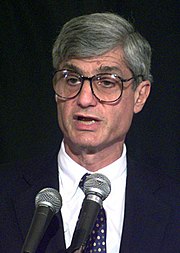Robert Rubin
As of 2024, Rubin is active in several organizations, including as a co-founder of The Hamilton Project, as co-chair emeritus of the Council on Foreign Relations, and as a senior counselor at Centerview Partners.
[6] Rubin was an attorney at the firm of Cleary, Gottlieb, Steen & Hamilton in New York City from 1964 to 1966 before joining Goldman Sachs in 1966 as an associate in the risk arbitrage department.
[12] The National Economic Council, or NEC, enabled the White House to coordinate closely the workings of the Cabinet departments and agencies on policies ranging from budget and tax to international trade and alleviating poverty.
[16] Supporters said the Act helped create the late 1990s budget surplus and strong economic growth, while opponents noted it raised taxes.
[23] Senator Chuck Hagel (R-NE) called Rubin "an ideal public servant who put policy before politics.
"[25] Upon being sworn into office as Treasury secretary in January 1995, Rubin was confronted with the Mexican peso crisis, which threatened to result in Mexico defaulting on its foreign obligations.
[26] President Bill Clinton, with the advice of Rubin and Greenspan, provided $20 billion in U.S. loan guarantees to the Mexican government through the Exchange Stabilization Fund.
[17] Early in the Clinton administration, Rubin touted a balanced budget and a strong dollar as a way for the Fed to lower interest rates.
[38] In an interview on ABC's This Week program in April 2010, former President Clinton said Rubin was wrong in the advice he gave him not to regulate derivatives, which was by then seen as one of the underlying causes of the 2007–08 financial crisis.
He said Clinton still wished he had pursued legislation to regulate derivatives while confirming that he still believed he had received excellent advice on the economy and the financial system from Rubin and others during his presidency.
[42] As Treasury Secretary, Robert Rubin was on the record for stating that the Glass-Steagall Act was obsolete and outdated, and indeed its provisions had become less effective over time.
This resulted in part from lobbying pressure exercised by Sanford I. Weill on Congress and the White House to repeal the Act, and so allow the mega-merger he had organized between Travelers Group and Citicorp in 1998 to stand.
Reflecting on his decision to join an institution devoted to bringing economic activity to neglected areas of the country, the Chicago Tribune said the following in an editorial: "Even before he became Bill Clinton's treasury secretary, during his days as a high-powered Wall Street executive, Rubin was passionate about fostering business investment as the way to fight poverty in depressed city and rural areas.
Rubin called a ranking Treasury Department official, unsuccessfully seeking the Bush Administration's help in forestalling the downgrade.
[51][52] Rubin later maintained that he had acted both as a Citigroup executive protecting his company's position and as a former Treasury official concerned about the impact that Enron's failure might have on the larger economy.
[53] The Wall Street Journal reported Rubin joined Citigroup as a board member and as a participant "in strategic managerial and operational matters of the Company, but [...] no line responsibilities".
[54] Following the 2008 financial crisis, critics argued Rubin increased risk-taking at Citigroup, thereby exposing the bank to greater losses, and that economic policies he promoted as Treasury secretary exacerbated the situation.
[56] In December 2008, investors filed a lawsuit contending that Citigroup executives, including Rubin, sold shares at inflated prices while concealing the firm's risks.
He serves as a trustee of Mount Sinai Health System and as co-chair of the advisory board of the Peter G. Peterson Foundation.
[65][69] Additionally, Rubin serves as a senior counselor at Centerview Partners, an investment banking advisory firm based in New York City.
[70] Rubin also served on the Global Citizenship Commission, convened by former British Prime Minister Gordon Brown, which reexamined and proposed an update to the United Nations' 1948 Universal Declaration on Human Rights.
[74] Rubin has advocated for fiscal discipline and public investment, and worked to turn the federal budget deficit to a surplus while Treasury Secretary.
[78] The Chicago Tribune and Associated Press have stated that Rubin's policies as Treasury Secretary helped drive American economic growth in the 1990s.
[18] He has also opposed tax cuts that disproportionately benefit high earners, including those enacted during the administrations of George W. Bush and Donald Trump.
[84][85] In April 2016, he was one of eight former Treasury secretaries who called on the United Kingdom to remain a member of the European Union ahead of the June 2016 Referendum.

